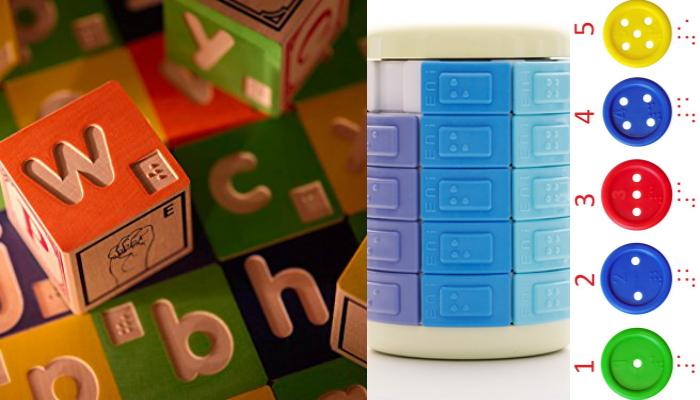How to Help Your Blind Child Survive (and maybe even enjoy) Christmas

Have you ever thought about what Christmas must be like to a blind or visually impaired child?
Think of all the decorations, scents, songs, and sounds associated with the holidays.
Will all this change be exciting or overwhelming for your child?
It’s a good idea to start thinking about Christmas early and how your child will react to all the new senses and get togethers. With just a little effort on your part you can make this season Blind-Kid Friendly so that your child can have fun and enjoy herself too!

Holiday Pitfalls
What is it about the holidays that makes people want to go completely overboard with scented candles and loud Bing Crosby music? And how will all those smells and sounds disrupt your child’s understanding of what’s going on around her?
Let’s think through the possible problems:
- Will the homes of friends and relations be transformed with dubious taste and lots of ‘kitsch’ into ‘Grotty Grottos’, their halls decked with plastic holly and ivy, sad, singing Santa’s and robins, reindeers and Christmas trees in every room?
- Will furniture have been cunningly moved ensuring rooms are obstacle courses for even sighted guests?
- Will they be treating your whole family to reproduction odors that a laboratory chemist thought were a passable imitation of ‘Odor of Celebration’ replete with synthetic pine, cinnamon, and nutmeg?
- Will their homes be filled with strange music you would never play, at volumes that would make their neighbor’s ears bleed?? (Will you be pleading with Johnny Mathis and Elvis in your dreams to “Please stop about little drummer boys and babies in mangers”?)
- Will your home, and those you visit, be filled with those “relative strangers:” the relations you never see at any other time of year (often for good reason), but who will expect your child to recognize them immediately anyway?
- Will holiday meals consist of party food—both unwholesome and unappetizing—that you would never normally consider allowing your children to eat?
- Will there be rooms full of strangers who want to touch, kiss, and cuddle her without a word of explanation or introduction?
- Will there be nowhere for her to have a quiet moment, a few minutes time-out?
- Will your friends and relatives be pressing wrapped boxes into tiny hands and waiting for expressions of delight and gratitude which will never come because what your child is feeling is fear and bewilderment?

Could This All be Done Better?
Of course it could! With a little thought you could make the holiday season magical for your child just by incorporating her needs into your festive equations.
- Decorate with lights:
If your child has good light perception, make the most of it. Go mad with decorative lights for your tree and battery operated table decorations. They are guaranteed to enchant.
- Decorate with shapes:
If light perception is problematic or absent, go for shapes. Christmas is especially good for iconic shapes and outlines and perhaps it would be more satisfying for a child with little or no vision to have carte blanche to feel a strong tree shape that can be hung with shatter-proof baubles (check that they tinkle!), candy decorations, and the more traditional little bells and stars.
- Explain everything:
It may seem self evident to you what the purpose of things are, but try explaining to your little one why you are celebrating. Thanksgiving has a fairly straightforward premise but explaining Christmas will give lots of parents pause. It’s a great opportunity to re-evaluate your own beliefs and to look squarely at the religious and traditional values you wish to pass on.
- Beware of fake smells:
If the smell is not natural—don’t do it! The glorious smell of mince tarts and Christmas cake baking cannot be reproduced by synthetic smells from store-bought candles, potpourri, and the like. It is intrusive and unnecessary to alter the natural smells which make a home known and comfortable to a child. If you have a real tree—great! The smells of fresh pine are a lovely addition to a room and are unlikely to offend tiny noses. Chemically synthesized “smells of Christmas” are a different matter entirely!
- Wear the same perfumes:
Speaking of smells, this is not a good time for you to change the perfume or aftershave you wear, or even the body-wash you use. Blind and visually impaired children derive tremendous comfort from the familiar smell of parents (sighted kids do, too, but it’s rarely noticed or mentioned). And if she can see very bright colors or very bold patterns then wear them to parties, church services, etc. so that she knows she can find you in a group of people. It’s easier for kids to move away from parents when they know they can find their way back to familiarity in a moment.
- Don’t abandon routine:
Keep closely to your child’s bedtime and nap schedule. A child, whether with sight problems or not, cannot be expected to give of their best when they are sleep deprived, and a cranky child is an unpleasant experience for everyone. So be firm about leaving parties—or making parties leave you—in good time for your child to be able to wind down, talk over her day, and then get a restful sleep. It provides you with a well deserved rest too: It’s a no brainer!
- Keep food to the standard fare, too:
If your child is having difficulty accepting more sophisticated or adventurous party food, then try to keep it simple. Better to come prepared with a small bag of things you know she’ll eat than having to leave early, or worse, stay hungry.
- Don’t hoard your knowledge:
Beforehand, your friends and relatives should have an idea of how to behave with your child, and what to expect from her. You can make a reasonably astute guess that the people who love you and your family have concerns about making the occasion comfortable and enjoyable for you and your disabled child. If some people don’t know that there are sight issues for you and your child to manage, it’s simply not fair (to everyone concerned) if you don’t take the time and care to explain this.Most reasonable people will be delighted to take your advice and they will be much more natural and comfortable with your child if you give them a few pointers. If you know Jenny will not want to be touched by anyone but you—for heaven’s sake don’t keep it to yourself! But don’t wait till the party to educate and inform folk—that’s objectionable for any number of reasons. Do it quietly and calmly beforehand, and let everyone keep their dignity (and their temper!)
- Simplify gift wrapping:
Unwrapping gifts can be a soul destroying struggle. It is the common experience of parents that blind and visually impaired kids need easy-to-open presents. Lavish wrapping and multiple layers are confusing and frustrating. If you let friends and relatives know this before they begin preparing presents, it’s an easy accommodation that people are happy to make. And don’t forget that some toys require complex construction best done before the grand opening. Most kids’ toys come with batteries where they are required now; but it’s worth checking. Who wants a present that doesn’t work till tomorrow, when you can’t even see what it does today!
- Build in plenty of time for her to examine her gifts:
And be prepared for her to reject them. You cannot force any child to immediately display delight and fascination if she’s just not interested. This could be a tricky moment for the gift giver—but not if you have done the preparation beforehand. Blind kids take much longer to get to know new toys; this is entirely natural when you consider that she will know the toy in a different way to a sighted child and if you have explained this, why would anyone be offended?
- Spread out the gift opening:
An orgy of present opening is unlikely to appeal to a visually impaired or blind child, so let people know that one present will be opened now and the rest staggered over the next few days (or even weeks). Again, if you explain, most reasonable, intelligent people will understand and comply with your wishes. Where people cannot or will not understand, it is only important that they comply and for the sake of your child’s enjoyment and comfort, you must simply insist (in the nicest way possible).
- Play with advent calendars:
These are a terrific way to count down to the Big Day and allow you to build and manage your child’s anticipation of the festivities. They can be as tactile, audible, or edible as you think suitable, and you could even start the season by helping your child to make one. It’s a great opportunity to talk about what’s coming up!
Remember: You could arrange a spectacular Christmas or Thanksgiving celebration involving six stunning courses of fantastic food in splendidly arranged and decorated surroundings, but if you are cranky, short tempered, and exhausted, is it really a celebration?
Look at things from your child’s point of view—what’s more valuable? A cordon bleu meal in spotless surroundings? Or you, easy-going, happy, and ready to celebrate?
Relax and dial down your plans if you want a family holiday to remember for the right reasons!

Look Out for Tiny Miracles!
I speak from experience, here. My daughter, who is visually impaired, had reached the age of two and a half years old and was still exhibiting almost no language skills whatsoever. Professional advice was to wait without worrying too much—an impossibility you’ll probably agree; she was almost mute!
On Christmas Eve two years ago, we put up our tree and went to bed to await the arrival of Santa. When we got up again next morning, it was still dark outside, so we put on the tree lights to illuminate our twinkling, sparkling, gift-littered sitting room.
My daughter came into the room a little while later. I can only guess at what she could see, but she had good light perception and seemed entranced! All she said was, “Oh, wow.”
At breakfast she said a little more…
By the time Christmas dinner was served, she was more voluble still…
Within the week, she had more than seventy words! A tiny, mundane, desperately hoped for, miracle.
What will you be asking Santa for this year?

Related Posts

Eye Conditions and Syndromes, Visual Impairment
Neuralink Announces Plans to Restore Sight to the Blind with Brain Chip
Elon Musk’s company Neuralink has announced plans to begin human trials of its new “Blindsight” brain chip by the end of 2025.

Visual Impairment
The Gift of Understanding: How a Young Child Helps His Blind Father Navigate Life
When a parent is blind, it’s natural for people to wonder how their sighted child will adapt. Will they struggle to understand their parent’s needs? Will they feel burdened by...

Braille and Literacy, Toys, Visual Impairment
24 Braille Toys for Kids Who are Blind
Everything from alphabet blocks to raised line coloring pages and activity books to puzzles to card and board games... and so much more! And it's all in braille ready for...